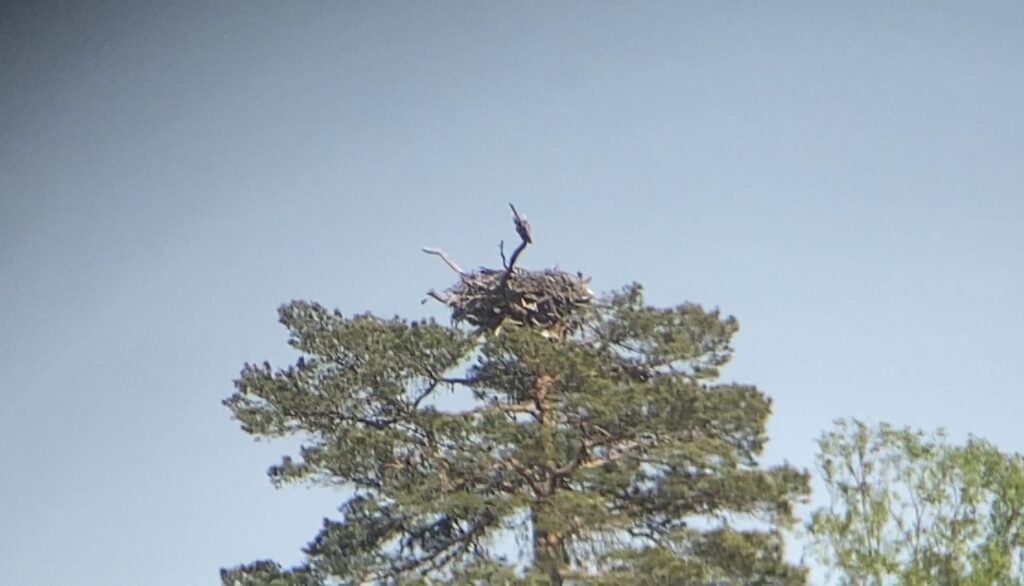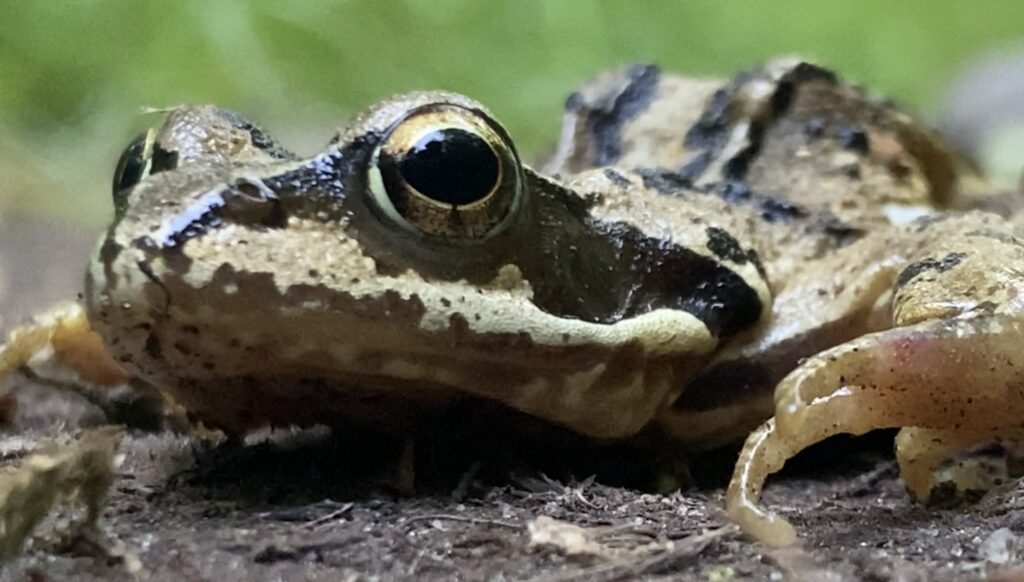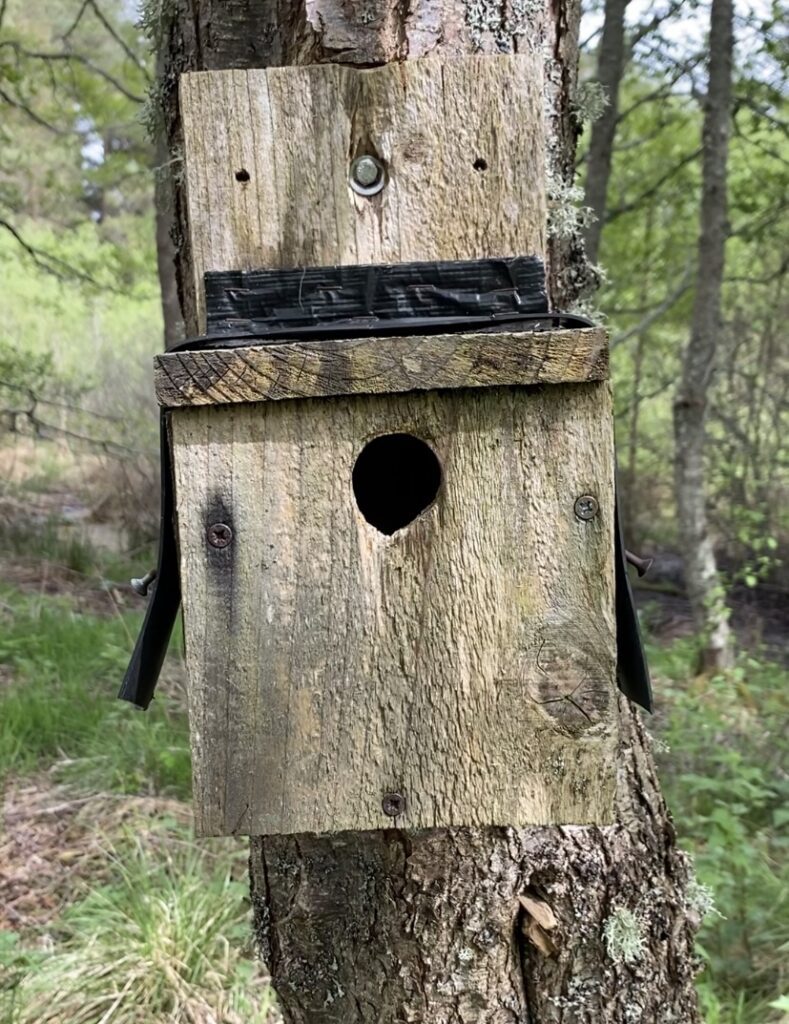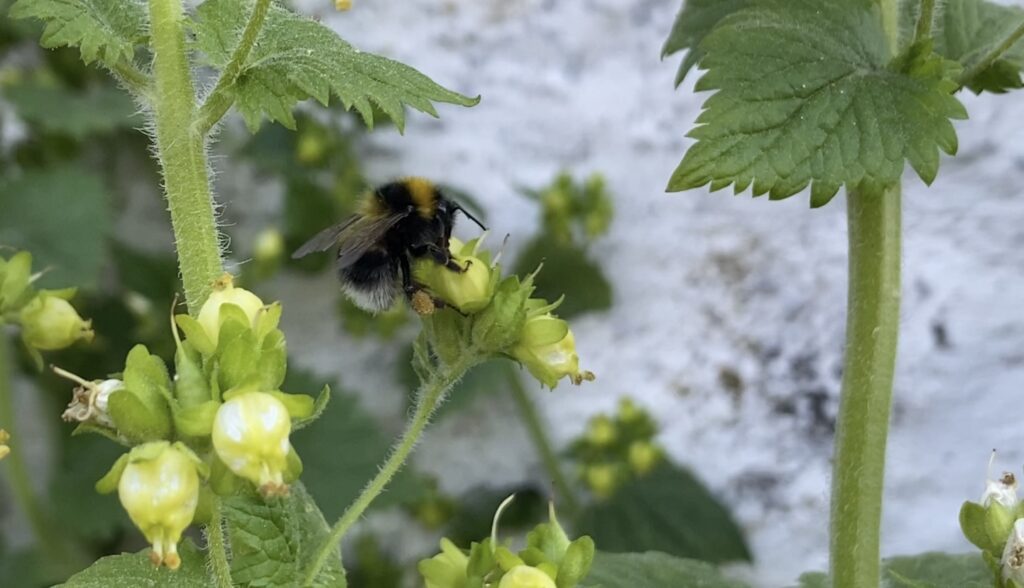Written by and photographs by Heather Sykes
At SusThingsOut, we got the opportunity to visit the RSPB Loch Garten Nature Reserve and talk to a volunteer there. The site is a beautiful haven of wildlife and is being well looked after and monitored with RSPB volunteering. The hardworking volunteers have travelled from all over the UK to be able to help look after Loch Garten Nature Reserve.
We were able to talk to one of the volunteers to see what life is like on a nature reserve. During our conversation, we learnt what is involved in a day’s work on the reserve. We also found out more about the reserve itself and its importance.

Loch Garten
Loch Garten is a conservation area in the Speyside region of north Scotland, famous for its birdwatching. It is in the north of the Cairngorms National Park.
The area is known for its osprey residents, having played a significant role in their survival. In the 1950s, RSPB Loch Garten brought back the endangered ospreys with Operation Ospreys. Having been an extinct breeding bird in 1916 in Scotland, 24-hour protection watch was given in 1958 for the new breeding birds. This, therefore, meant the birds got the chance to come back.
Our volunteer noted that Loch Garten is ‘well known for bringing back ospreys, or the first place for ospreys returning to the UK in the 1950s’. She also noted that it is ‘not just about the birds, it’s about the trees as well’.
Today, there is one pair of breeding ospreys at Loch Garten. These birds are monitored in order to track their progress. Osprey watch cameras are set up on the nest built for the birds and can be found live-streamed here and here. There are currently two surviving chicks on the nest, which is down from three after a goshawk attack.
It is clear that Loch Garten is an important part of these birds’ survival, and the work of the volunteers ensures that it continues further.

RSPB Volunteering on a Reserve
We asked the RSPB volunteer a range of questions including what a day’s work looks like on the reserve. Not every day looks the same for any one volunteer, so, they can expect a range of duties throughout the week.
Some RSPB volunteering tasks include working in the nature centre, doing conservation duties, as well as completing patrols. These roles also look different from day to day. Working in the nature centre involves welcoming visitors, selling memberships, and telling people about the ospreys and what else they might see on the reserve.
Conservation duties can range hugely from repairing wooden gates and filling in potholes, to weeding in the tree nursery, and completing bird count surveys. She noted that duties can vary saying, ‘I’ll work out on reserve on the trails, interacting with visitors and I’ll also do a little bit of conservation work anywhere on the reserve.’
Completing patrols is a hugely important role. Without evening patrols, the nature centre is then at risk of wildfires. Evening patrols involve covering large areas of land to ensure no campers are creating unsafe campfires. It also involves checking on pre-established wildfire remains, to make sure they have not relit. This is a vital role that must be completed every day all day, both during the day and the night.
Wildfires
There have been recent fires which volunteers are having to monitor. This means checking the site by physically feeling how warm the ground is and then getting water from the loch to soak the ground. Fires spread easily on the reserve, as the ground is made of peat which is particularly dry at the moment. Even the smallest ember left from a campfire can create a fire. Embers can stay lit underground, invisible from the surface.
Not all campers realise the severe dangers a campfire can cause, even when they put it out. The volunteers have to talk to campers and advise them to not build fires. Loch Garten nature reserve had a fire in the early summer believed to have been caused by a campfire. After the fire was put out, volunteers checked the location on patrol.
RSPB Volunteering Days Off
Volunteering full-time at Loch Garten means a full week of work, however, volunteers also get days off. Typically, scheduling allows for two days off in a row to act as the volunteer’s weekend, but this might be at any point in the week.
When we spoke, the RSPB volunteer noted how she enjoyed her days off. She likes ‘to go exploring to other reserves locally, or maybe up to different lochs to try and spot different birds, do a bit of birdwatching’.
Could RSPB Volunteering Be Your Next Step?
Becoming an RSPB volunteer is a great opportunity for anyone interested in birds, conservation, or sustainability.
At the University of Worcester, we want students to feel prepared for a job in the sustainability job market. We value sustainability education and work hard to embed it into our learning in all courses. ‘Social Responsibility‘ is one of the five Graduate Attributes, so ‘Education for Sustainable Futures’ is a part of our curriculum policy.
Considering what the ‘next step’ is after university can be daunting. An opportunity such as volunteering for the RSPB could be a great step to boost your CV and gain invaluable experience.
Volunteering is not a viable option for all students, so big organisations like the RSPB work to make these opportunities more accessible. Loch Garten Nature Reserve offers volunteers accommodation for the duration of their scheme. This makes completing RSPB volunteering possible for those interested in getting into the industry.
The RSPB volunteering demographic is varied, so you can meet a range of people. There are lots of exciting opportunities both long-term and short-term, as well as flexible opportunities and residential opportunities.
Sustainable Careers
Our RSPB volunteer expressed an interest in the sustainability sector and said that the volunteering opportunity felt like a good next step as a recent graduate. She also noted how much she enjoyed volunteering with her favourite part being ‘conservation work’ especially when ‘working in the tree nursery’.
Finding sustainable work is an aspect many students are now considering when they leave university. Recent graduates value the sustainability of a role when job hunting, considering it as an important factor. Our volunteer shared that the sustainability of a role was ‘really important’ to her as she wants to be ‘working outdoors in nature, to try and make the world a better place for wildlife’.
RSPB volunteering is a great way to develop skills and get experience to prepare for work in sustainability.
What Can We Do At Home? RSPB Volunteering Advice
As seen with the issue of wildfires, RSPB volunteering is crucial to keeping the reserve safe. We also know that Loch Garten and the RSPB volunteering have helped bring back the ospreys and monitored their success. There are also many further reasons as to why the reserve is important as well as RSPB volunteering.
Not only does the reserve create a home for many birds and animals, but it also creates a great learning environment. We can monitor the birds on an ornithological level, but we can also teach a wider audience more about birds. Loch Garten Nature Reserve welcomes all kinds of guests, providing a place for bird enthusiasts, but also families wanting a day out. The reserve allows children and families to learn more about birdlife, so we are a more informed general public.
Beyond volunteering for the RSPB, there are lots of other things we can do at home to help. We asked our RSPB volunteer for some advice on what small changes we can make.
Bird Feeders and Water
She suggested bird feeders as a great step to helping British birdlife. Having a hanging bird feeder both helps the local bird population to thrive and also makes your garden a more interesting space. For many students, this might not be an option. If you do not have your own garden, but would still love to see more birds out of your window, there are options for you. There are clear acrylic bird feeders available, which can suction onto a window, allowing you to feed the birds up close.
Including a bird bath or source of water in your bird banquet can also be really useful. Birds need water both to drink and also bathe in. This is especially important in extreme weather. Keeping water available in your garden through the winter is important, as often birds struggle to find a non-frozen water supply. Regularly ensuring that there is non-frozen water in your garden will really help. Also during the hot summer months, birds need extra help. Heatwaves make it hard for birds to find a water supply too. The RSPB has shared some advice on bird water here. Our volunteer suggested that even ‘a little pond’ can make a difference.

Bird Boxes
Having a bird box for the birdlife to take shelter in can be another great option. Our RSPB volunteer thought this would be a great way to support the birds, especially during nesting season. March to August is the typical season that breeding birds will nest.
Timed Trimming
The RSPB also suggests that during this time we avoid trimming hedges, as to avoid disturbing any nesting birds. If it is essential that you must trim a hedge back during this time, make sure that you check for any nests before starting to trim. Avoid any active nests after your check.
The Big Garden Birdwatch
Having bird feeders, water and bird boxes in your garden will encourage more action out of your windows. Complete the Big Garden Birdwatch to record and track the new life. People across Britain take part in this annual event. It is the UK’s largest ‘citizen science wildlife survey’. 540,000 people took part in 2023.
To take part all you need to do is spend one hour watching out of your window. Just make note of which birds you saw, and how many of the species you saw at one single time. So, if you see three bluetits at once, you can log that as three. However, if you see a bluetit appear three different times, you can only log this as one entry. This is because it could be the same bluetit returning. This survey has helped the RSPB get a better understanding of the numbers of different bird species we have across the UK.

Garden for the Birds
If you do have a garden, having the right kind of plants can help make it bird-friendly. RSPB volunteering involves making sure the right plants are available on reserve for the birds, but you can also do this at home. At Loch Garten Nature Reserve, there are lots of blaeberries which the capercaillie like.
There are lots of plants that birds love, particularly trees and bushes with berries. Birds will both nest in the birds and bushes but also eat the berries. Holly is a native plant to the UK and provides both dense cover and food for the birds so is a popular one in British bird-friendly gardens.
Spreading wildflower seeds is also a great idea to encourage birdlife. Wildflower creates an abundance of insects and a brilliant garden habitat, this therefore creates another food supply for bird. Eco-diverse gardens filled with native plants are a surefire way to welcome birds into your garden. Both the Woodland Trust and the RSPB have written more about how to make your garden bird-friendly.
RSPB Volunteering: Life on a Nature Reserve
Volunteering for the RSPB can be hugely rewarding. The volunteer we spoke to has had a huge range of opportunities to try new things that will be invaluable when looking for work in the industry. The experience gained through volunteering is what many employers look for. The University of Worcester supported a project closer to home with Worcester and Malvern RSBP with an innovative project to support farmland birds.https://www.worcester.ac.uk/about/news/2021-university-of-worcester-and-rspb-group-link-up-to-help-farmland-birds
Even if you do not volunteer directly for the RSPB, there are so many things we can all be doing to directly help out the birds. Having supportive gardens, as well as RSPB volunteering and nature reserves, working all together, we can create a safer, and more sustainable environment for our birdlife in the UK.